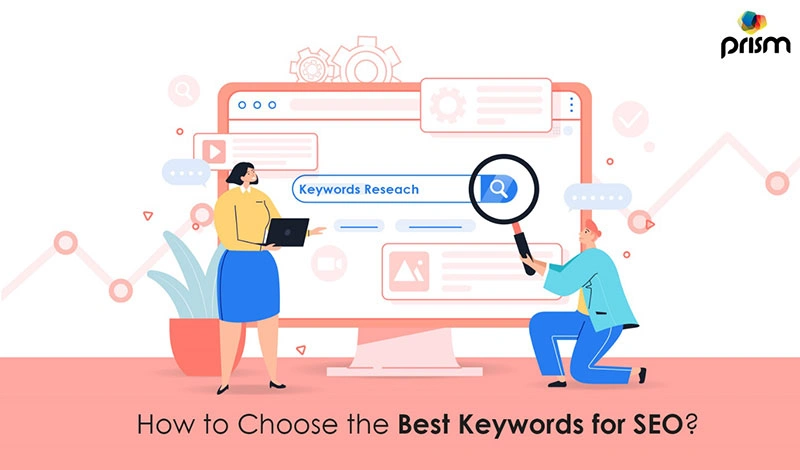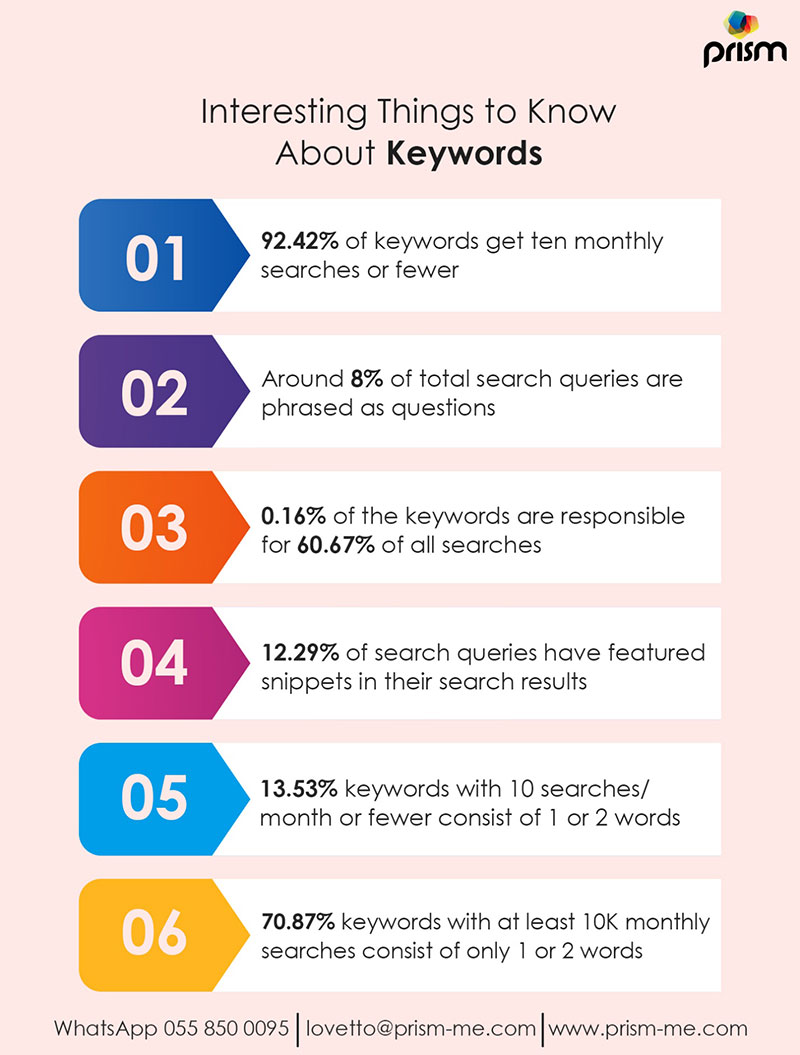
Table Of Contents
- Analyze the Intent of the Search
- Different Types of Keywords
- Use Tools for Keyword Research
- Refine Your Keywords Using LSI
- Analyze the Competition
- Keywords and Matching Media
- Create a Link to Landing Page
- Conclusion
Keywords are a critical aspect of SEO and many practitioners still struggle with choosing the right ones when creating content. Picking the right keywords for your content is like choosing an outfit for a blind date. It's up to you to show off your assets and prevent your obvious flaws from being exposed. This is why it's important to pick carefully crafted, rich and targeted keywords that will lead you and your visitors to satisfying results.
Over half of all shoppers use Google to research products before making a purchase. These search phrases or keywords are used by the search engines to discover relevant results and you will definitely not get many visitors if your website doesn't rank on the first page.
So, now that we’ve stated the obvious that Keywords are important for SEO and the most crucial factor in ranking a website, we can move on to the burning question. How to choose the best performing keywords?
Some say it is highly important to strategically choose keywords from specific industries in order to work your way up in search rankings, attract more qualified traffic and eventually convert into sales/leads/etc.
The only problem with this approach is that there is often a lot of pressure involved to find the perfect keyword, which can cause so much stress it actually puts whoever is trying to rank a website in a panic mode. So, what is the solution?
This article discusses how to choose the right keywords for SEO and when you should think of hiring an SEO agency. You will learn about different types of keywords and how to find the most relevant ones. Then you'll learn how to improve those phrases and include them on your landing pages.
Follow these 7 keyword research tips to create content that will help your website rank high on search engines.
1. Analyze the Intent of the Search
Search intent informs what keywords to choose based on why people search. They are separated into three groups
- Navigational - the user is looking for a different web page.
- Informational - looking into a subject.
- Commercial - a desire to buy something
You must think like your customer in order to select the ideal keywords for the greatest outcomes. The terms 'purchase low-cost water heater' and 'water heater broke' are significantly different. The first is a commercial key phrase, whereas the second is informative.
With the purpose of completing your call-to-action, you should include content on all three topics (CTA). Different landing pages or web pages dedicated to certain search phrases will be targeted by your keywords. You should offer some unique content connected to the phrase in the case of informational searches.
Blog articles are ideal for this type of searches because they can contain multiple keywords. Obviously, the content must be inter-linked to your product pages or contact forms.
Commercial or transitional purposes are the most straightforward to concentrate on, but they are also the most competitive. That is why having your material written by SEO experts can assist Google to match your keywords when it crawls your website.
2. Different Types of Keywords
Consider the three different forms of keyword research before getting started.
- Head keywords
- Body keywords
- Long Tail keyword
Head keywords are one or two words long and yield a slew of search results. Consider the term "birthday cards," which Google matches with 1.17 billion pages.
The body keywords are usually two to three words long. Google searches for "mother birthday cards" now yield 3 million results.
Long-tail phrases have at least four words. They produce targeted results, and the majority of users know how to use them when searching.
As you might expect, ranking high for head keywords is really challenging. Concentrating on the long tail, however, is easier and more fruitful.
3. Use Tools for Keyword Research
Knowing where to start your study is one of the best strategies for finding the right keywords. Google's Keyword Planner is a free tool that can help you figure out which keywords work and which ones don't. It is available through the Google Ads platform.
The number of people who searched for certain keywords over time is shown in the results. Related phrases with relevant traffic numbers are also displayed by the service. You can incorporate the phrases that function well into your marketing strategy. This list can be used to bundle together related keywords for use in your SEO strategy.
Moz Explorer is a good alternative to Google's search engine. Create a free account for up to 10 searches by entering a keyword or web address. The Program includes monthly traffic numbers as well as an estimate of how difficult it will be to rank for a specific keyword.
It is a comprehensive report with a SERP analysis and organic CTR. Don't worry if you don't understand what those sentences mean. Using the appropriate SEO agency will get you out of the jargon and go right to the point.

4. Refine Your Keywords Using LSI (Latent Semantic Indexing)
Latent Semantic Indexing (LSI) is a long way of describing word association. Google uses LSI to provide relevant results based on context. In other words, the search engine tries to figure out what you're talking about by analyzing the keywords that you used.
To demonstrate, open Google and begin typing a sentence. The autocomplete option shows you results depending on your search terms. However, as you continue to type, those phrases will shift. That's because as your long-tail search expands, Google discovers more possibilities.
The results of related searches will also appear at the bottom of the screen. To refine your keyword list, use these semantic or related words. They've been recognized as vital by Google, so take advantage of them.
5. Analyze the Competition
Another excellent technique to get the finest keywords is to look at the websites of your competitors.
There are keyword research tools that can help you analyze the competitor keywords. It is quite possible to scrap all the keywords your competitors are using and are ranking for.
It will assist you to decide on what keywords to target while optimizing your website for search engines. These tools will give you a ton of information that you can use to optimize your web pages with the relevant keywords and phrases that people search for in your industry.
Tools can help you evaluate traffic on any website, including your competitors'. Use them to figure out where they are in the rankings. Then use what you've learned to help you develop your own plan.
That is why many businesses hire an SEO company to conduct their research. They not only receive the information, but the SEO service providers also do the legwork for them by coming up with strategies, implementing those strategies, and keeping track of the progress.
6. Keywords and Matching Media
It takes a certain level of skill to write keyword-rick content. Many websites, on the other hand, appear to cram keywords into the text and hope for the best. Spam-filled pages are actively targeted by Google, which either eliminates them or ranks them extremely low.
It's critical to use the proper combination of keywords and related phrases in your text copy. Otherwise, all of your efforts will be for naught. Additionally, pairing the proper image with the right term might lead to a significant increase in rankings.
Great website content should be at the heart of any SEO strategy. Good website copy, intelligent blogs, and articles are all part of SEO. These will aid with the ranking of your website. This is something that must be done correctly from the beginning.
7. Create a Link to Landing Page
You must optimize your landing pages to link logically to your keyword choices or they will not work. Because landing pages display targeted information, it's critical that you link them to the keywords that you use.
The page title, headers, and alt image tags should all contain your chosen keywords ideally. When choosing keywords, keep your landing page in mind – not only will Google rank your page higher, but a well-optimized landing page will also serve as the starting point.
Conclusion
This is it for today’s blog. Please feel free to reach out to me if you have any questions or comments and I will get back to you as soon as I can.
Running a business and finding it hard to rank on Google? Contact Prism Digital, the best SEO agency in Dubai and we will create tailored SEO strategies to rank your website on all the primary keywords related to your niche so that you can get all the qualified leads you need. See you on the other side. Goodbye.

About The Author: Lovetto Nazareth
Lovetto Nazareth is a digital marketing consultant and agency owner of Prism Digital. He has been in the advertising and digital marketing business for the last 2 decades and has managed thousands of campaigns and generated millions of dollars of new leads. He is an avid adventure sports enthusiast and a singer-songwriter. Follow him on social media on @Lovetto Nazareth



